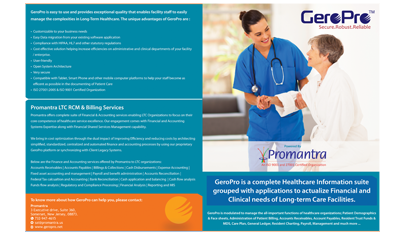The Role of Software in Streamlining SNFs Operations

Skilled Nursing Facilities (SNFs) operate in a highly regulated and financially complex environment. Managing billing, payroll, reimbursements, and compliance manually can lead to errors, inefficiencies, and revenue losses. In recent years, software and automation have emerged as critical solutions to streamline financial operations in SNFs. By implementing automation-driven financial management systems, SNFs can reduce paperwork, improve billing accuracy, enhance cash flow, and ensure compliance with Medicare, Medicaid, and private insurers. This blog explores the role of software in optimizing financial operations, backed by case studies, industry insights, and best practices.
1. The Financial Challenges in Skilled Nursing Facilities
Before diving into the impact of automation, it's essential to understand the primary financial pain points that SNFs face:
- Billing & Reimbursement Issues – Manual claim submissions often lead to errors, delays in reimbursements, and high denial rates.
- Compliance Complexities – CMS and Medicaid regulations demand accurate documentation and timely reporting.
- Labor Costs & Payroll Management – Staffing shortages and overtime expenses increase financial strain.
- Accounts Receivable (AR) Bottlenecks – Slow collections impact cash flow and financial stability.
- Operational Inefficiencies – Paper-based record-keeping and outdated financial workflows contribute to revenue leakage.
2. How Automation Transforms Financial Operations in SNFs
By integrating software-driven automation, SNFs can address these financial pain points while enhancing efficiency and profitability. Below are key areas where automation has a transformative impact:
2.1 Revenue Cycle Management (RCM) & Billing Automation
The revenue cycle in SNFs is highly complex, involving multiple payers, claim submissions, and stringent documentation requirements. Manual billing processes lead to errors and delayed payments.
How Automation Helps:
- Automated claim submissions reduce human errors, ensuring higher acceptance rates.
- AI-driven denial management analyzes rejected claims and suggests corrections before resubmission.
- Integrated EHR & billing systems minimize documentation gaps and coding inaccuracies.
- Real-time eligibility verification helps prevent claim rejections due to coverage issues.
Case Study: A Texas-based SNF implemented an AI-powered billing system that reduced its claim denial rate by 35% within six months, leading to faster reimbursement cycles and improved cash flow.
Key Takeaway: SNFs that adopt automated revenue cycle management can significantly reduce claim denials and accelerate reimbursements.
2.2 Payroll & Workforce Management Automation
Staffing expenses account for a major portion of SNF operating costs. Manual payroll management leads to overtime discrepancies, compliance issues, and inefficiencies.
How Automation Helps:
- AI-powered scheduling tools optimize staff allocation and reduce unnecessary overtime costs.
- Automated payroll processing ensures accurate compensation and compliance with labor laws.
- Predictive analytics identify staffing trends to adjust workforce planning accordingly.
Case Study: A Florida SNF cut payroll errors by 40% after deploying an automated workforce management system that optimized staff scheduling and reduced reliance on expensive agency staffing.
Key Takeaway: Automating payroll and scheduling processes enhances financial efficiency while maintaining quality patient care.
2.3 Accounts Receivable & Collection Optimization
Delays in payments from Medicare, Medicaid, and private insurers cause cash flow disruptions for SNFs. Manual tracking of outstanding payments often leads to missed follow-ups and revenue leakage.
How Automation Helps:
- AI-driven AR tracking systems send automated reminders to insurers and patients.
- Predictive analytics forecast cash flow fluctuations and suggest proactive measures.
- Automated payment posting ensures real-time reconciliation with financial records.
Case Study: Midwest SNF improved its cash collections by 25% within a year by implementing an automated AR system that flagged outstanding claims for immediate follow-up.
Key Takeaway: Automated AR solutions prevent revenue leakage and enhance financial stability.
2.4 Regulatory Compliance & Audit Readiness
SNFs must comply with CMS regulations, HIPAA, and Medicaid reimbursement guidelines. Non-compliance can lead to hefty fines, legal liabilities, and loss of accreditation.
How Automation Helps:
- AI-powered compliance tracking ensures all billing and documentation meets regulatory requirements.
- Automated reporting tools generate real-time audit trails to simplify compliance checks.
- Cloud-based document storage ensures secure and easy access to financial records during inspections.
Example: A New York SNF avoided a $100,000 fine by using an AI-driven compliance platform that flagged potential Medicare billing violations before submission.
Key Takeaway: Automating compliance processes minimizes regulatory risks and improves audit readiness.
3. The Role of LTCPro in Financial Automation for SNFs
LTCPro is a leading financial automation platform designed specifically for Skilled Nursing Facilities. It integrates billing, payroll, compliance, and revenue cycle management into a seamless digital ecosystem.
How LTCPro Helps:
- Automated Claims Management – Reduces denial rates by up to 40% through AI-driven claim analysis.
- Payroll & Staffing Optimization – Cuts overtime costs and improves workforce efficiency.
- Real-Time AR Tracking – Enhances collections and cash flow predictability.
- Regulatory Compliance Automation – Ensures CMS & Medicaid compliance in real-time.
- EHR Integration – Creates a seamless workflow between clinical and financial operations.
Case Study: A California SNF using LTCPro reported a 30% improvement in revenue cycle efficiency within a year, with faster reimbursements and reduced compliance violations.
Key Takeaway: LTCPro empowers SNFs with financial automation tools that enhance efficiency, reduce costs, and optimize reimbursement processes.
The future of Skilled Nursing Facility Financial Operations lies in automation and software integration. By leveraging AI-powered billing, automated payroll processing, and predictive financial analytics, SNFs can enhance accuracy, reduce costs, and ensure compliance.
Key Takeaways:
- Billing automation reduces claim denials and accelerates reimbursements.
- Payroll software optimizes staffing costs and prevents overtime inefficiencies.
- Automated AR systems improve cash collections and financial stability.
- Compliance automation safeguards SNFs against penalties and legal risks.
- LTCPro offers a comprehensive financial automation solution tailored for SNFs.
A perfect fit for Skilled Nursing Facilities, Assisted Living Facilities, Home Health, Hospice and Other Day Care Centres.
Download BrochureRequest a demo


























